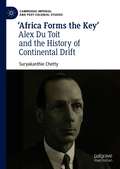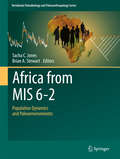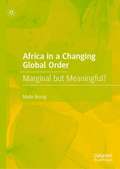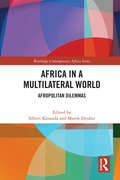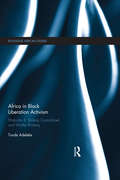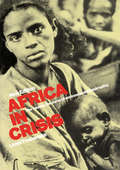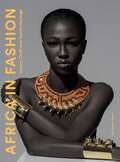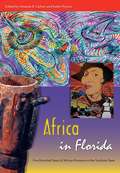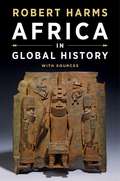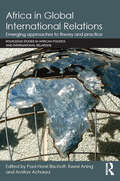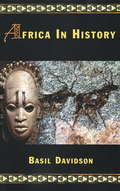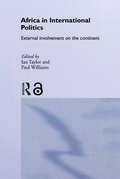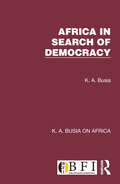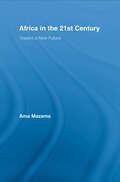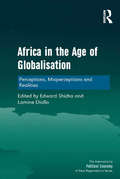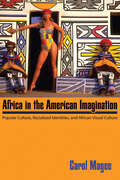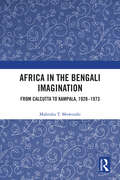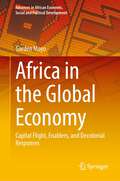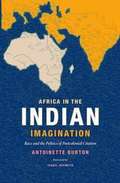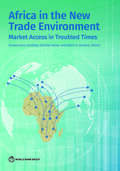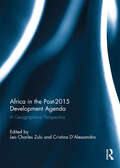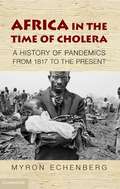- Table View
- List View
‘Africa Forms the Key’: Alex Du Toit and the History of Continental Drift (Cambridge Imperial and Post-Colonial Studies)
by Suryakanthie ChettyThis book examines the work of prominent South African geologist Alex Du Toit as a means of understanding the debate around continental drift both in segregation-era South Africa and internationally. It contextualises Du Toit’s work within a particularly formative period of South African science, from the paleoanthropological discoveries that sparked debates about the origins of humankind to Jan Smuts’ own theory of holism. Beyond South African scientific discoveries, the book sets Du Toit’s work against a backdrop of ideological struggles over space, both domestically in terms of segregation and nationalism, as well as internationally as South Africa sought to assert its position within the Commonwealth. These debates were embodied by Du Toit’s work on the theory of continental drift, which put Africa – and South Africa – at the centre geologically and geographically. The author also focuses on the divisions in geology caused by drift theory, tracing the vigorous intellectual debate and dissent indicative of the ideological milieu within which scientific thought is constructed. It traces the history of continental drift from its inception in the nineteenth century and later work of Alfred Wegener, which was both elaborated upon and substantiated by Du Toit. The study further focuses on Du Toit’s research on continental drift in South African and South America, and the geological, fossil and climatological evidence used to bolster this theory.
Africa from MIS 6-2: Population Dynamics and Paleoenvironments (Vertebrate Paleobiology and Paleoanthropology)
by Sacha C. Jones Brian A. StewartBringing together archaeological, paleoenvironmental, paleontological and genetic data, this book makes a first attempt to reconstruct African population histories from out species' evolution to the Holocene. Africa during Marine Isotope Stages (MIS) 6 to 2 (~190-12,000 years ago) witnessed the biological development and behavioral florescence of our species. Modern human population dynamics, which involved multiple population expansions, dispersals, contractions and extinctions, played a central role in our species' evolutionary trajectory. So far, the demographic processes - modern human population sizes, distributions and movements - that occurred within Africa during this critical period have been consistently under-addressed. The authors of this volume aim at (1) examining the impact of this glacial-interglacial- glacial cycle on human group sizes, movements and distributions throughout Africa; (2) investigating the macro- and micro-evolutionary processes underpinning our species' anatomical and behavioral evolution; and (3) setting an agenda whereby Africa can benefit from, and eventually contribute to, the increasingly sophisticated theoretical and methodological palaeodemographic frameworks developed on other continents.
The Africa Growth and Opportunity Act and Its Rules of Origin: Generosity Undermined?
by Aaditya Mattoo Devesh Roy Arvind SubramanianThe African Growth and Opportunity Act (AGOA), signed into American law on May 18, 2000, is a major plank of U.S. initiatives toward the African continent. The Act aims broadly at improving economic policymaking in Africa, enabling countries to embrace globalization, and securing durable political and economic stability. As an incentive for Africa to adopt the necessary policy reform, AGOA offers increased preferential access for African exports to the United States. This paper describes the provisions of AGOA and assesses its quantitative impact on African exports, particularly in the apparel sector.
Africa in a Changing Global Order: Marginal but Meaningful?
by Malte BrosigThis book focuses on marginal actors in the global order. Such a perspective is often missing as global order analysis is often biased towards exploring large powerful actors and equating their relations with global order. Such an approach is not only dated but also analytically incomplete. It is because of the increasingly decentred nature of global order, that marginal actors and their relations, tactics, strategies and approaches matter for global order as they matter for these actors. The book starts by providing an analytical framework exploring different policy options for African agency which are located along a nexus of choices ranging from accommodation, engagement to system transformation. The selection of a particular interaction type is argued to be dependent on external opportunity structures in the form of different global orders reaching from competitive polarity to dispersed forms of authority or even non-polarity. In addition to these external conditions, the ability to generate meaningful African agency facilitates a greater role in global order. Empirically, the book covers four policy fields which are peace and security, international criminal justice, economics and trade and COVID-19.
Africa in a Multilateral World: Afropolitan Dilemmas (Routledge Contemporary Africa)
by Albert KasandaThe book analyses how Africans and Africa relate to other parts of the multilateral world, and to the world in general, and how these relations stem from local, national and regional interactions in different parts of Africa, as well as Africa as a whole. The first part focuses on the assumptions that are necessary to understand the role of Africa on the global stage, especially from the perspectives of political philosophy and global and international studies. The second part of the book looks at both Afropolitan trends and the limits of Afropolitanism. In the third part the authors focus on specific African global tendencies stemming from the local conditions in several case studies. Traditional and modern politics is connected, problematically, with the current Jihadist organisations in the local African conditions related to unilateralism and global war on terror, for example. The fourth part deals with the relevance of the language ambivalence in relation to global interactions. It examines various views of African philosophy and lays bare the perception of earlier colonial languages in view of their current strength of global action. This book will be of interest to scholars of African studies, political philosophy, politics and global studies.
Africa in Black Liberation Activism: Malcolm X, Stokely Carmichael and Walter Rodney (Routledge African Studies)
by Tunde AdelekeThis book revisits and analyzes three of the most accomplished twentieth century Black Diaspora activists: Malcolm X (1925–1965), Stokely Carmichael (1941–1998) and Walter Rodney (1942–1980). All three began their careers in the Diaspora and later turned toward Africa. This became the foundation for developing and solidifying a global force that would advance the struggles of Africans and people of African descent in the Diaspora. Adeleke engages and explores this “African-centered” discourse of resistance which informed the collective struggles of these three men. The book illuminates shared and unifying attributes as well as differences, presenting these men as unified by a continuum of struggle against, and resistance to, shared historical and cultural challenges that transcended geographical spaces and historical times. Africa in Black Liberation Activism will be of interest to scholars and students of African-American history, African Studies and the African Diaspora.
Africa in Crisis: The Causes and Cures of Environmental Bankruptcy
by Lloyd TimberlakeThe first edition of this incisive text on the problems of drought and famine facing Africa won worldwide critical acclaim. Revised with a new introduction, Lloyd Timberlake's bestselling study is invaluable reading for anyone interested in Africa.
Africa in Fashion: Luxury, Craft and Textile Heritage
by Ken Kweku NimoAfrica in Fashion explores the kaleidoscope of craft cultures that have shaped African fashion for centuries and captures the intriguing stories of contemporary and avant-garde African brands.Part One looks at Africa's rich cultural heritage and place in the network of global fashion. The first chapter retells the history of African fashion, exploring Africa's textile traditions, artisanship and role as a global resource. The second chapter presents a New Africa and examines the promise and potential of Africa's markets, while challenging stereotypes and the concept of European hegemony particularly in the realm of luxury fashion. It also spotlights Africa's unique position as the global industry shifts towards a more sustainable future. Part Two ushers the reader into the spectacular world of African fashion today. It showcases a carefully curated set of the continent's most dynamic brands and, through interviews with prominent and inspiring designers, offers rare insight into their ethos and design practice. Covering unisex fashion, menswear, womenswear, accessories and jewellery the brands are each purposefully selected to contribute uniquely to the mosaic of Africa evolving creative landscape.
Africa in Fashion: Luxury, Craft and Textile Heritage
by Ken Kweku NimoAfrica in Fashion explores the kaleidoscope of craft cultures that have shaped African fashion for centuries and captures the intriguing stories of contemporary and avant-garde African brands.Part One looks at Africa's rich cultural heritage and place in the network of global fashion. The first chapter retells the history of African fashion, exploring Africa's textile traditions, artisanship and role as a global resource. The second chapter presents a New Africa and examines the promise and potential of Africa's markets, while challenging stereotypes and the concept of European hegemony particularly in the realm of luxury fashion. It also spotlights Africa's unique position as the global industry shifts towards a more sustainable future. Part Two ushers the reader into the spectacular world of African fashion today. It showcases a carefully curated set of the continent's most dynamic brands and, through interviews with prominent and inspiring designers, offers rare insight into their ethos and design practice. Covering unisex fashion, menswear, womenswear, accessories and jewellery the brands are each purposefully selected to contribute uniquely to the mosaic of Africa evolving creative landscape.
Africa in Florida: Five Hundred Years of African Presence in the Sunshine State
by Amanda B. Carlson Robin Poynor"An inspiring, original, and significant work that takes our notions of 'diaspora' to exciting places and offers new and thoughtful data on the presence and impact of 'Africa' in Florida history, lives, and objects. Africa in Florida is an important contribution to American history and to the continuing and transforming histories of African diasporas and Africa itself. "--Henry John Drewal, editor of Sacred Waters "Fascinating. Indispensable. With contributions by excellent scholars in the field of African and African diaspora studies and cultural studies, the volume provides diverse meanings and interpretations of contacts among Africans from the continent, Europeans, and indigenous people of Florida that resulted in works of creative arts, language, music, and food. "--Jacob K. Olupona, author of City of 201 Gods Over the course of centuries, immigrants from numerous countries in contemporary Africa have influenced the Sunshine State's history and culture. Through a critical evaluation of the influences and effects of the numerous African and African-influenced cultures that have been a part of the state's history, this collection of essays and art explores how Florida both shapes and is shaped by the multiple African diasporas that move through it. Africa in Florida challenges the way American history and southern studies have characterized African contributions to the development of the United States by showing how Africans, both free and enslaved, asserted themselves as explorers, farmers, slave owners, artists, and more.
Africa In Global History With Sources
by Robert HarmsAward-winning historian Robert Harms offers a contemporary history of Africa--one that reflects the continent's cultural richness and diversity while presenting its history in a global context. A chronological narrative covers the origins of humankind to the present, focusing on similarities and differences across regions and the continent as a whole. A stunning full-color design engages the reader with primary sources, images, and maps, and instructor resources enhance the teaching experience.
Africa in Global International Relations: Emerging approaches to theory and practice (Routledge Studies in African Politics and International Relations)
by Amitav Acharya Kwesi Aning Paul-Henri BischoffRecent scholarship in International Relations (IR) has started to study the meaning and implications of a non-Western world. With this comes the need for a new paradigm of IR theory that is more global, open, inclusive, and able to capture the voices and experiences of both Western and non-Western worlds. This book investigates why Africa has been marginalised in IR discipline and theory and how this issue can be addressed in the context of the emerging Global IR paradigm. To have relevance for Africa, a new IR theory needs to be more inclusive, intellectually negotiated and holistically steeped in the African context. In this innovative volume, each author takes a critical look at existing IR paradigms and offers a unique perspective based on the African experience. Following on from Amitav Acharya and Barry Buzan’s work, Non-Western International Relations Theory, it develops and advances non-Western IR theory and the idea of Global IR. This volume will be of key interest to scholars and students of African politics, international relations, IR theory and comparative politics.
Africa in History
by Basil DavidsonThe classic history of Africa from the green Sahara and the Iron Age through the 20th century.Basil Davidson's Africa in History was a landmark in the restoration of African history. For centuries the myth had prevailed that Africa had no history prior to direct contact with European "civilization". This new edition of Basil Davidson's book not only eradicated these myths, but takes account of much of the most recent scholarship about native African civilizations.
Africa in International Politics: External Involvement on the Continent (Routledge Advances in International Relations and Global Politics)
by Ian Taylor Paul WilliamsLocating Africa on the global stage, this book examines and compares external involvement in the continent, exploring the foreign policies of major states and international organizations towards Africa. The contributors work within a political economy framework in order to study how these powers have attempted to stimulate democracy, peace and prosperity in the context of neo-liberal hegemony and ask whom these attempts have benefited and failed.
Africa in Search of Democracy (K. A. Busia on Africa)
by K. A. BusiaOriginally published in 1967, reissued now with a new introduction, Africa in Search of Democracy in the author’s words was ‘a humble contribution to Africa’s search for political wisdom whereby to avoid destruction’. Written by the author during his time in voluntary exile, he was leader of the Parliamentary Opposition and of the United Party in Ghana which opposed the tyrannical rule of Nkrumah and his Convention People’s Party. In this book he proposed to examine the problems facing contemporary Africa within the context of the search for democracy; that is, for the establishment of societies which provide the best possible conditions for individual as well as social development within the widest measure of democratic freedom. The burning questions of nation building, of modernization, of raising standards of living, of achieving African unity, or harmonizing race relations and world peace, are discussed in relation to the quest for democracy.
Africa in the 21st Century: Toward a New Future (African Studies)
by Ama MazamaAfrica in the 21st Century: Toward a New Future brings together some of the finest Pan African and Afrocentric intellectuals to discuss the possibilities of a new future where the continent claims its own agency in response to the economic, social, political, and cultural problems which are found in every nation. The volume is structured around four sections: I. African Unity and Consciousness: Assets and Challenges; II. Language, Information, and Education; III. African Women, Children and Families; and IV. Political and Economic Future of the African World. In original essays, the authors raise the level of discourse around the questions of integration, pluralism, families, a federative state, and good governance. Each writer sees in the continent the potential for greatness and therefore articulates a theoretical and philosophical approach to Africa that constructs a victorious consciousness from hard concrete facts. This book will interest students and scholars of the history and politics of Africa as well as professional Africanists, Africologists, and international studies scholars who are inclined toward Africa.
Africa in the Age of Globalisation: Perceptions, Misperceptions and Realities (The International Political Economy of New Regionalisms Series)
by Edward Shizha Lamine DialloThis is a collection of bold and visionary scholarship that reveals an insightful exposition of re-visioning African development from African perspectives. It provides educators, policy makers, social workers, non-governmental agencies, and development agencies with an interdisciplinary conceptual base that can effectively guide them in planning and implementing programs for socio-economic development in Africa. The book provides up-to-date scholarly research on continental trends on various subjects and concerns of paramount importance to globalisation and development in Africa (politics, democracy, education, gender, technology, global relationships and the role of non-governmental organisations). The authors challenge the familiar paradigms in order to show how imperfectly, if at all, assumptions about globalisation and development theories have failed in their depictions and applications to Africa. The scholars in this volume both inform and advocate for a re-visioning of perceptions on Africa and how it navigates global processes.
Africa in the American Imagination: Popular Culture, Racialized Identities, and African Visual Culture
by Carol MageeIn the American world, the presence of African culture is sometimes fully embodied and sometimes leaves only a trace. Africa in the American Imagination: Popular Culture, Racialized Identities, and African Visual Culture explores this presence, examining Mattel's world of Barbie, the 1996 Sports Illustrated swimsuit issue, and Disney World, each of which repackages African visual culture for consumers. Because these cultural icons permeate American life, they represent the broader U.S. culture and its relationship to African culture. This study integrates approaches from art history and visual culture studies with those from culture, race, and popular culture studies to analyze this interchange. Two major threads weave throughout. One analyzes how the presentation of African visual culture in these popular culture forms conceptualizes Africa for the American public. The other investigates the way the uses of African visual culture focuses America's own self-awareness, particularly around black and white racialized identities. In exploring the multiple meanings that “Africa” has in American popular culture, Africa in the American Imagination argues that these cultural products embody multiple perspectives and speak to various sociopolitical contexts: the Cold War, civil rights, and contemporary eras of the United States; the apartheid and post-apartheid eras of South Africa; the colonial and postcolonial eras of Ghana; and the European era of African colonization.
Africa in the Bengali Imagination: From Calcutta to Kampala, 1928-1973
by Mahruba T. MowtushiThis book examines textual representations of Africa in the Indian imagination from 1928 to 1973. It critically analyses Bengali literature during this period, their imitation of colonial racial prejudices and how it allowed Bengalis to fashion their identity. It analyses the development of ‘Africa’ as an idea and historical reality through the writings of five Bengali writers including the Bengali novelist Bibhutibhushan Bandyopadhyay, the children’s author Hemendra Kumar Roy, the poet and philosopher Rabindranath Tagore, the playwright Ganesh Bagchi and the surrealist poet and founding editor of Transition magazine Rajat Neogy. The book shows how these writers engage with the idea of Africa and their influence in the construction of the Bengali cultural identity during the freedom struggle, the Partition of Bengal in 1947 and the creation of Bangladesh in 1971. The book offers readers a glimpse of the exotic imaginary locales of Africa while offering an in-depth look into the interconnected histories, cartographic routes and cultural exchange between India and Africa. A first of its kind, this book will be an excellent read for students and scholars of literature, comparative literature, history, cultural studies, postcolonial studies, South Asian studies, African studies and diaspora studies. .
Africa in the Global Economy: Capital Flight, Enablers, and Decolonial Responses (Advances in African Economic, Social and Political Development)
by Gorden MoyoThis book discusses the role played by powerful global institutions such as the IMF, the World Bank, the World Trade Organisation, multinational corporations, and the international credit rating agencies in keeping Africa marginalised in the world economy. The book focuses on the intrusive roles of these institutions as enablers and beneficiaries of capital outflows and financial subordination in Africa. Diverging from the official narrative that touts China and the other emerging economies as global reformers that are poised to partner Africa in its fight against financial subjugation, the book instead argues that, like the Western powers, the emerging economies are benefiting prodigiously from a rigged global financial system that keeps Africa as a net creditor to the rest of the world. The book draws its theoretical framework from the repressed heterodox theories including dependency, core-periphery, world systems and Marxist theories as well as the decolonial approach. It concludes with a call for a decolonial African agency that should champion an epistemic rebellion against the neo-liberal and neo-classic economic traditions that have been historically deployed to justify Africa’s subordinated position in the global economic governance. This book comes at moment in time when Africa is ready to become a Rule Maker not a Rule Taker. The analysis Dr. Moyo presents having been in the front line of public policy and international negotiations demonstrate the need for Africa to re-write the rules to foster our own Transformation. Jason Rosario Braganza, Executive Director, African Forum and Network on Debt and Development (AFRODAD)
Africa in the Indian Imagination: Race and the Politics of Postcolonial Citation
by Antoinette BurtonIn Africa in the Indian Imagination Antoinette Burton reframes our understanding of the postcolonial Afro-Asian solidarity that emerged from the 1955 Bandung conference. Afro-Asian solidarity is best understood, Burton contends, by using friction as a lens to expose the racial, class, gender, sexuality, caste, and political tensions throughout the postcolonial global South. Focusing on India's imagined relationship with Africa, Burton historicizes Africa's role in the emergence of a coherent postcolonial Indian identity. She shows how--despite Bandung's rhetoric of equality and brotherhood--Indian identity echoed colonial racial hierarchies in its subordination of Africans and blackness. Underscoring Indian anxiety over Africa and challenging the narratives and dearly held assumptions that presume a sentimentalized, nostalgic, and fraternal history of Afro-Asian solidarity, Burton demonstrates the continued need for anti-heroic, vexed, and fractious postcolonial critique.
Africa in the New Trade Environment: Market Access in Troubled Times
by Souleymane Coulibaly, Woubet Kassa, and Albert G. ZeufackAfrica represents a small share of global production and trade, while hosting half of the extreme poor worldwide. To catch up with the rest of the world, there is no alternative: the continent needs to link its production and trade to the global economy to take advantage of unlimited demand and innovation along the supply chain. The book presents a strategy to bolster Africa’s market access in the current global environment. It explores three key areas †“ the impact of trade agreements (unilateral, regional, and multilateral) with traditional partners (the United States and the European Union) and a way forward; the role of new market frontiers in Asia both from the perspective of restructuring economies in the region as well as changing global value chains (GVCs) and their implications for Africa; and finally an inward examination of the promise and challenges of regional trade and value chains. The book meticulously explores ways to maximize Africa’s access to the two leading world markets †“ the European Union and the United States †“ while at the same time diversifying market access to the emerging Asian market. In troubled times, it calls for the continent to anchor its market access strategy to deeper regional integration.
Africa in the Post-2015 Development Agenda: A Geographical Perspective
by Leo Charles Zulu and Cristina D’AlessandroThis book offers a multifaceted examination of Africa’s development into the post-2015 global agenda from a geographical perspective. As a diversified and highly applied discipline, geography has a lot to offer to global debates, nuanced analysis of problems on and the search for innovative solutions to advance the African development agenda beyond 2015. The end of the Millennium Development Goals (MDGs) era and the launch of the Sustainable Development Goals (SDGs) in September 2015 mark an important turning point for Africa and an opportune time to examine new challenges and opportunities that it faces. The regional disparities in MDG progress affirm an important geographic tenet that the unique yet internally differentiated socio-cultural, economic, political, ecological, biophysical and historical context give Africa distinctive challenges and opportunities that demand particular approaches to development. This edited book presents innovative contributions examining Africa’s development performance in diverse sectors during the MDG era as a basis for understanding prospects for its development in the SDG era and beyond. It offers new and innovative study perspectives and methodological approaches on urban transformation, development financing, food security, climate change, gender equality, health, and regional integration, among other topics, and useful insights for scholars, students and development practitioners. This book was originally published as a special issue of African Geographical Review, the journal of the American Association of Geographers’ Africa Specialty Group, to mark the transition from MDGs to SDGs.
Africa in the Time of Cholera
by Myron EchenbergThis book combines evidence from natural and social sciences to examine the impact on Africa of seven cholera pandemics since 1817, particularly the current impact of cholera on such major countries as Senegal, Angola, Mozambique, Congo, Zimbabwe and South Africa. Myron Echenberg highlights the irony that this once-terrible scourge, having receded from most of the globe, now kills thousands of Africans annually - Africa now accounts for more than 90 percent of the world's cases and deaths - and leaves many more with severe developmental impairment. Responsibility for the suffering caused is shared by Western lending and health institutions and by often venal and incompetent African leadership. If the threat of this old scourge is addressed with more urgency, great progress in the public health of Africans can be achieved.
Africa in the World: Capitalism, Empire, Nation-State
by Frederick CooperAt the Second World War's end, it was clear that business as usual in colonized Africa would not resume. W. E. B. Du Bois's The World and Africa, published in 1946, recognized the depth of the crisis that the war had brought to Europe, and hence to Europe's domination over much of the globe. Du Bois believed that Africa's past provided lessons for its future, for international statecraft, and for humanity's mastery of social relations and commerce. Frederick Cooper revisits a history in which Africans were both empire-builders and the objects of colonization, and participants in the events that gave rise to global capitalism. Of the many pathways out of empire that African leaders envisioned in the 1940s and 1950s, Cooper asks why they ultimately followed the one that led to the nation-state, a political form whose limitations and dangers were recognized by influential Africans at the time. Cooper takes account of the central fact of Africa's situation--extreme inequality between Africa and the western world, and extreme inequality within African societies--and considers the implications of this past trajectory for the future. Reflecting on the vast body of research on Africa since Du Bois's time, Cooper corrects outdated perceptions of a continent often relegated to the margins of world history and integrates its experience into the mainstream of global affairs.
